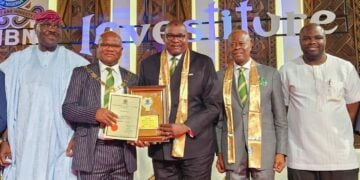Last week started out on a new note for Nigeria as power shifted from one government to another. The baton of leadership of the country was passed from Muhammadu Buhari to Bola Ahmed Tinubu. The transition of power was however the least of the news as the inaugural speech of the president was laden with critical policy changes.
Asides the removal of fuel subsidy that was mentioned by the president, major issues that bother on monetary policy were raised. Giving a hint on how monetary policy would go under his administration, President Tinubu stressed the need for an overhaul of the economy as he targets a higher Gross Domestic Product (GDP) growth and significantly reducing unemployment in the country.
According to him, these would be accomplished through budgetary reform that is expected to stimulate the economy without engendering inflation. Asides this, he plans an industrial policy that will utilise the full range of fiscal measures to promote domestic manufacturing and lessen import dependency.
For monetary policy, he stated the need for ‘thorough housecleaning’ saying, the Central Bank must work towards a unified exchange rate. Currently, the naira is selling at N760 to the dollar at the parallel market while it closed at N464.67 at the Investors’ and Exporters’ window. LEADERSHIP had reported last week that bids and sale of the greenback at the I&E window had risen to as high as N635.
Whilst the apex bank had maintained its stance on a managed float of the currency amidst multiple exchange rates, Tinubu in his inaugural speech, said harmonising exchange rates in the country, “will direct funds away from arbitrage into meaningful investment in the plant, equipment and jobs that power the real economy.”
The president also furthered that “interest rates need to be reduced to increase investment and consumer purchasing in ways that sustain the economy at a higher level.” The Monetary Policy Committee had maintained its stance on raising benchmark interest rate in a bid to address rising inflation in the country. So far, it had raised rates seven time to 18.5 per cent as at its meeting last month.
Analysts at FBN Quest had noted that the president’s address “is likely to be well-received by investors. The President emphasised the administration’s commitment to addressing the burden of multiple taxes and barriers to investment.
“Importantly, measures will be implemented to facilitate the smooth repatriation of dividends and profits for investors and businesses. On a related note, the President acknowledged the shortcomings of the existing monetary policy and emphasised the importance of the Central Bank to work towards establishing a unified exchange rate system.
“The harmonisation of multiple exchange rates will lead to favourable outcomes for the country’s fiscal purse. A downward adjustment to the naira exchange rate will result in higher naira revenue derived from the conversion of dollar earnings. It will also close the arbitrage gap between the official and parallel market exchange rates.”
On his part, the chief executive of Centre for the Promotion of Private Enterprise (CPPE), Dr Muda Yusuf welcomed the decision of the new President Bola Tinubu to put in place a unified exchange rate regime. It should be clarified that this is not a devaluation proposition.
Noting that it is a pricing mechanism that reflects the demand and supply fundamentals in the foreign exchange market which allows for rate adjustments as and when necessary, he added that, “It is a model that is predictable, transparent and sustainable. It is a policy regime that would reduce uncertainty and inspire the confidence of investors, it is a policy framework that would minimise discretion and arbitrage in the foreign exchange allocation mechanism.”
According to him, a unified exchange rate regime offers the economy liquidity in the foreign exchange market, whilst reducing uncertainty and enhancing the confidence of investors. He furthered that an harmonised exchange rate is more transparent as mechanism for forex allocation.
To him, “it minimises discretion in the allocation of forex and reduces corruption vulnerabilities and opportunities for round tripping and other sharp practices.”
Yusuf noted that, the current foreign exchange policy regime creates multiple exchange rates and results in distortions and negative outcomes such as the widening gap between the official and parallel market exchange rates which allows forex round-tripping to flourish.
Also, he said, the multiple rates in the forex market has led to the collapse of liquidity in the foreign exchange market resulting in acute forex scarcity, whilst creating a major disincentive for forex inflows into the economy, thus suppressing forex supply.





